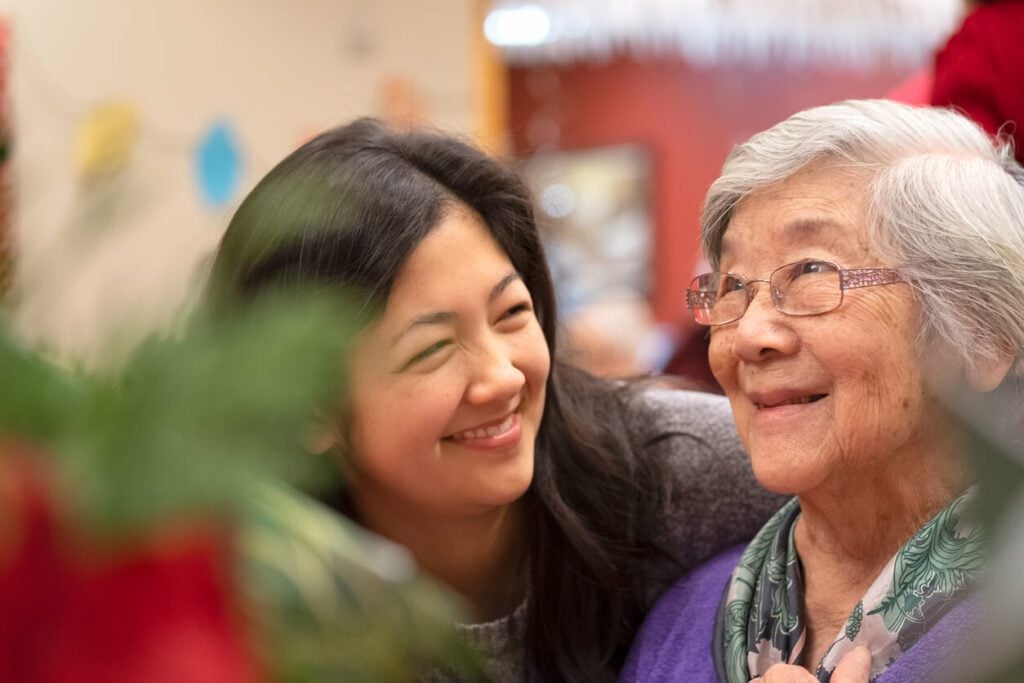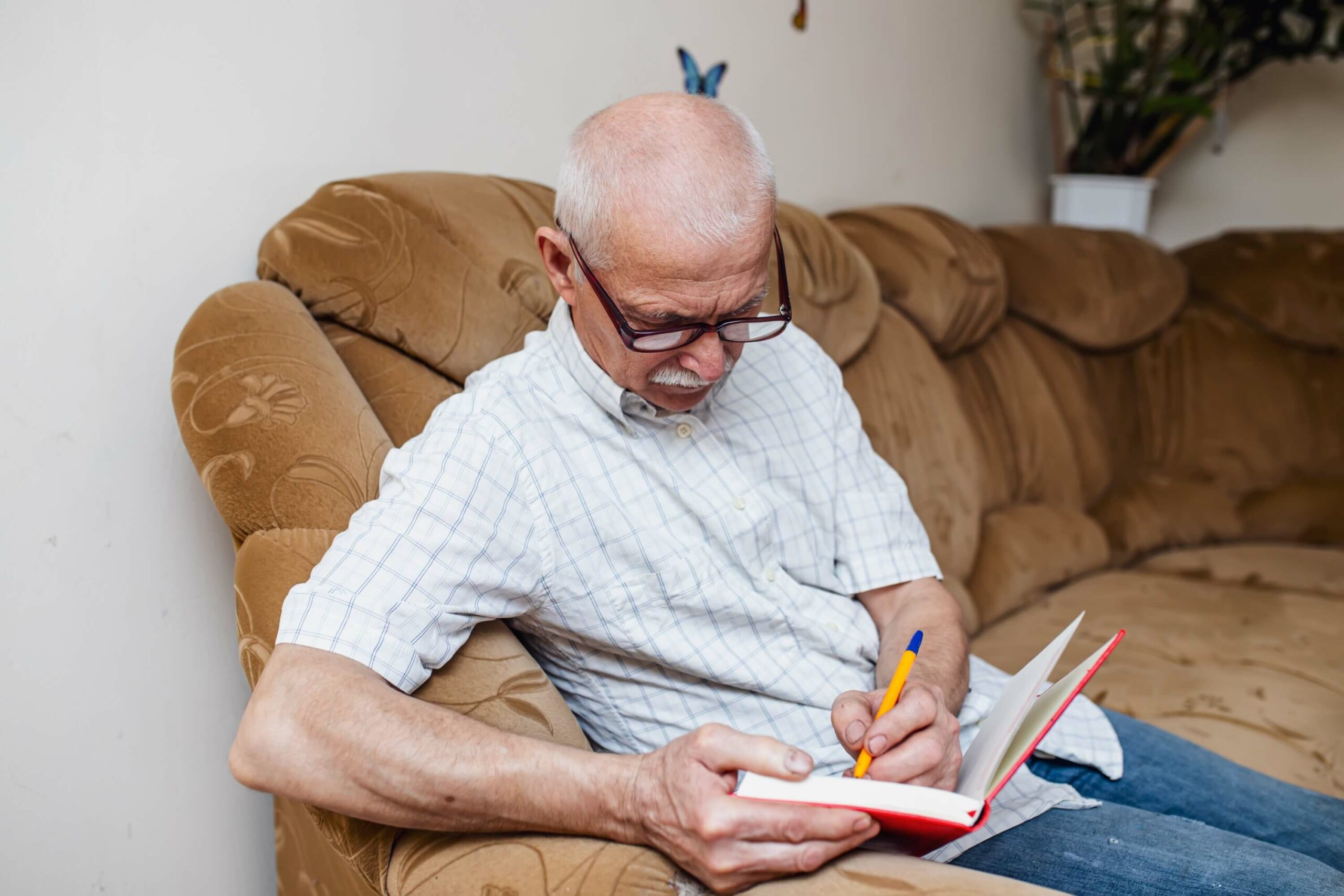Discussing difficult topics: advice from Zoe Feldwick

Care can be challenging to talk about, especially with those closest to us.
The older people in our lives are usually the ones we turn to for support, so when these roles shift we can experience a wide range of emotions. Whether you’re worrying about their safety, want to plan for the future from a financial perspective, or simply need to understand what they’d like to happen when the time comes, beginning an open conversation about care can be hard for all involved.
Zoe Feldwick, an Integrative Therapeutic Counsellor and member of the British Association of Counsellors and Psychotherapists, has shared her advice on establishing healthy communication and discussing difficult later life topics with family.
In a hurry? We’ve shared some of Zoe’s top tips in this video.
Why speaking to an older family member about care can feel uncomfortable
There are a few reasons why talking to older family members about care can feel uncomfortable. The shift in family roles can certainly play a part – the family member in question may have had a “head of the family” role, and perhaps may be seen as the person who has looked after everyone else.
This may bring up some anxieties around taking away that role, or a fear of infantilising the older family member, even if this is by no means the intention.
The impact of avoiding difficult conversations
Avoiding difficult topics unfortunately doesn’t make them go away. By not discussing these issues with the people involved we aren’t being honest, and may feel like we are hiding something from them. Ultimately this can affect the way we feel about these people, and we might find that this impacts the way we relate and interact with them.

Person-centred approaches you can apply when having care conversations
Person-centred and humanistic approaches in therapy are incredibly complex. On a simplistic level, the work I do is grounded in the three “core conditions” of empathy (trying to understand the other’s point of view), congruence (being genuine and authentic with the other person) and unconditional positive regard (treating the other with respect and without judgement).
Ultimately, it’s about respecting the other person and their experiences as a unique individual. This can be helpful to hold in mind when talking to loved ones about care, as although we may feel we know what the right decision might be in relation to our values and experiences, this may not be aligned with the other’s point of view and experiences.
What to do if you’re feeling worried or anxious
Difficult conversations are tricky because we cannot predict or mind-read how the other person might react, and uncertainty is uncomfortable to be with. In an attempt to alleviate this discomfort we might try and run through the worst-case scenarios in our minds, believing that if we prepare for the worst then we will be better equipped to face the conversation in reality.
However what tends to happen is that we become more fearful of these invented scenarios. This can then trigger our stress responses whenever we think about the impending conversation and we may start to feel more anxious or worried.
If you are finding yourself feeling worried or anxious about having these sort of conversations, I would approach this in two stages. Firstly, to notice and acknowledge these feelings without judgement or criticism – these feelings are normal responses to stressful situations. When you notice these feelings, try to offer yourself something that moves you into a calmer, more grounded state. This could be engaging in a hobby, a short breathing or meditation exercise (there are lots of apps available that offer guided meditation), taking a walk in nature or journaling/talking to a partner or friend about these feelings.
How to better prepare for difficult or uncomfortable conversations
As a therapist, it’s really important for me to ensure that I am feeling as balanced and grounded as possible when I go into a session with a client. If I’m feeling dysregulated or stressed, then I cannot be with other’s distress or respond to their feelings in a compassionate or balanced way.
I would approach difficult conversations in the same way – put things in place beforehand that allow you to feel grounded and balanced, such as those mentioned previously.
Choose an environment that feels relaxed and safe for all parties, when you all have time and space to properly listen to one another, with no distractions. It can also be helpful to write down any key points or things you would like to say ahead of the talk, as if we are stressed or anxious we can find it harder to recall information.

Communication strategies and understanding different perspectives
The most important strategy is treating each other with respect and empathy. If a person feels that they are being attacked, blamed or their values and way of life feel under threat then it’s a completely normal reaction to become defensive.
“I” statements can be really helpful when communicating difficult topics, as they focus on taking responsibility for communicating your own feelings and emotions, rather than coming across as blaming or persecutory towards the other person. Try following the format of “I feel (emotion/feeling) when (explanation). For example “I feel anxious when you are at home alone, I worry that there’s no one there to help if an accident happens.”
Tone of voice can also be really important – we can say non-blaming things in a blaming way. Use a soft and even tone when speaking, and try to slow your speaking down if you feel yourself speeding up or rushing through.
Moving things forward in a positive way
Agree on a date to reconvene and review. This should not be too far in the future, but a timeframe that allows enough time for each person to process and reflect on what has been said, and be with their own thoughts and feelings.
You may not come to an agreed point to view straight away – and that is okay!

Zoe Feldwick, MSc, is a BACP registered Integrative Therapeutic Counsellor based in Bath. Her work combines person-centred and psychodynamic theory, psychoeducation and more mindful, embodied techniques. Creating a safe, compassionate and non-judgemental space, Zoe works with those experiencing difficulties such as anxiety and depression, bereavement, stress, trauma, and relationship issues.
To find out more about Zoe’s work, visit her website below.
Read more care guides

How to prepare for a live-in caregiver
Care at home: how to prepare the home for a live-in caregiver A live-in carer can make a massive difference to your loved one’s quality

6 tips for finding the right live-in carer
Finding the right live-in carer is a significant and deeply personal decision, impacting your loved one and the entire family. You’re seeking someone trustworthy, compassionate,

The cost of care – everything you need to know
The true cost of care – everything you need to know Discover the true cost of care and explore your funding options with our care

Understanding autism in older adults
While Autism is usually diagnosed in childhood, an increasing number of older adults are being formally diagnosed in later life. Masking autism symptoms can result

A guide to speaking with a loved one about home care
Why do older adults resist care? A guide to speaking with a loved one about home care Bringing up the topic of care at home

How to choose the right personal alarm for seniors: A comprehensive guide
Personal alarms for elderly Discover how personal alarms work, who they’re best suited to, and how they provide greater peace of mind to older people